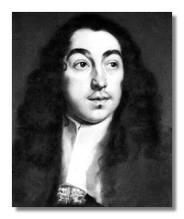Consort zu 4 Stimmen
Buy this item (out of stock)
Product ID: SC4 AM 073
By Matthew Locke
Publisher:
Schott Edition
Series:
MusiCAAntiqua
Line Up:
Strings
Set & Score
This item is out of stock
Reviews and rating
No review available, be the first to write one!


Composer
Matthew Locke (1621-1677)

Matthew Locke (ca. 1621 – August 1677) was an English Baroque composer and music theorist.
As a boy, Locke was trained in the choir of Exeter Cathedral, under Edward Gibbons, the brother of Orlando Gibbons. At the age of eighteen Locke travelled in the Netherlands, possibly converting to Roman Catholicism at the time.
Locke, with Christopher Gibbons (the son of Orlando), composed the score for Cupid and Death, the 1653 masque by Caroline era playwright James Shirley. Their score for that work is the sole surviving score for a dramatic work from that era. Locke was one of the quintet of composers who provided music for The Siege of Rhodes (1656), the breakthrough early opera by Sir William Davenant. Locke wrote music for subsequent Davenant operas, The Cruelty of the Spaniards in Peru (1658) and The History of Sir Francis Drake (1659). He wrote the music for the processional march for the coronation of Charles II.
In 1673 Locke's treatise on music theory, Melothesia, was published. The title page describes him as "Composer in Ordinary to His Majesty, and organist of her Majesty's chapel"—those monarchs being Charles II and Catherine of Braganza. Locke also served King Charles as Composer of the Wind Music ("music for the King's sackbutts and cornets"), and Composer for the Violins. (His successor in the latter office was Henry Purcell; Locke has been described as Purcell's mentor). In 1675 he composed the music for the score of Thomas Shadwell's Psyche.
More info about the composer...


